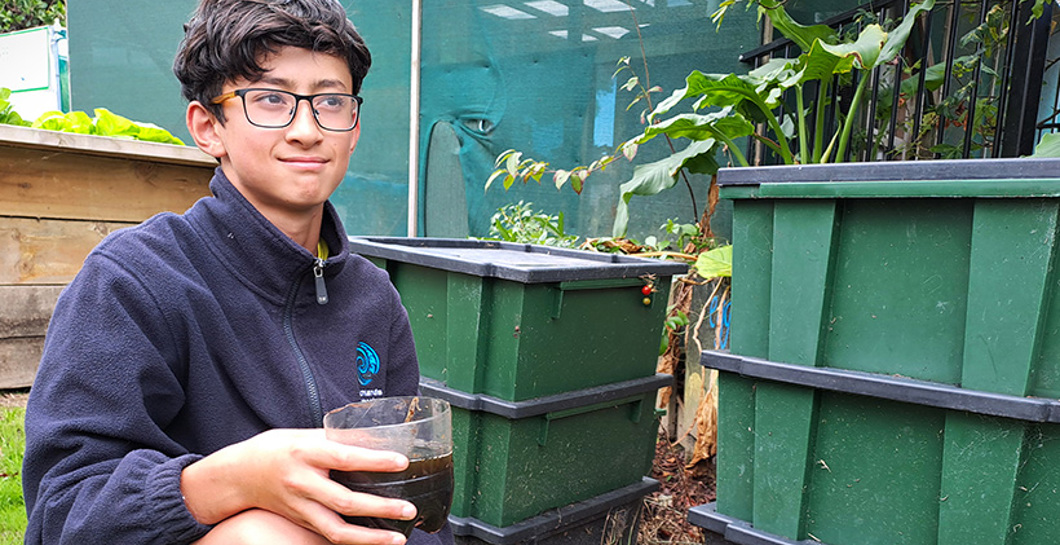Beachlands School

Becoming a community composting hub
Beachlands School is a Green-Gold Enviroschool with many sustainability initiatives and practices. Their on-campus Kaiawa Gardens are home to extensive raised beds for growing vegetables, as well as beehives, a chicken coop, and a large-scale hot composting system. Through participating in the Mana Ora Programme, Beachlands was able to streamline their compost collection systems and to generate revenue for future projects.
The key students involved in Mana Ora were Beachlands’ education for sustainability (“EfS”) leaders – Year 7 and 8 students who have chosen sustainability as part of their leadership responsibilities. Supported by Technology teacher Linda Le Verne and Deputy Principal Charl Dreyer, the EfS leaders opted to focus on composting after thinking deeply about effective ways to decarbonise.

As outlined in their Mana Ora funding application, the school conducted a whole-school waste audit in early 2023. In doing so, they discovered that 79% of waste being sent to landfill could have been diverted. While some of this was mixed recycling, most was organic, and the school was producing nearly 5kg of food scraps and compostable paper per day.
“Many waste projects are focused on litter, and while this is important for the beautification of the school, it does not reduce the amount of carbon we are producing. Recycling also requires a lot of resources and is not as effective at decarbonising as composting and reducing your consumption.”

Although the school had recently purchased a large-scale hot compost system to process scraps, Linda and the student team knew that the collection process within school classrooms and shared spaces needed improvement. As part of their Climate Action Funding, a series of buckets were purchased, and teachers were invited to take ownership of scrap collection within their classroom and surrounding area.
As Linda explains, these staff champions collect the waste, mostly from students’ lunchboxes or when cooking is done in class. The EfS students then collect the buckets every couple of days and bring them to the composting area for processing. With at least one staff champion from each year level, the system has good coverage and seems to be functioning well.
Another aspiration of Beachlands’ Mana Ora project was to create a funding source to reinvest money into EfS. By purchasing two extra worm bins, the team was able to learn how to care for tiger worms and to sell diluted worm tea to the community for $2 a bottle. During Plastic Free July, EfS students also sewed produce bags from discarded curtain fabric, and sold these to families on whānau day and through the school’s app.

The team’s ongoing commitment to auditing has helped them troubleshoot and streamline their systems. After a mid-winter waste audit, a large bag of food-related waste was discovered within the sample and revealed that Beachlands’ after-school care programme had been overlooked in their diversion system. By remedying this with the programme’s leaders, they were able to save another stream of waste from landfill.
Beachlands School is on its way towards becoming a composting hub within the community. Because of the large processing power of the hot composting system, the team has invited families and local neighbours to bring in their household food waste – meat and dairy included.
“We are outside the council’s kerbside food scrap collection zone. So we’re giving people an opportunity to divert their scraps by bringing it into the school.” - Linda Le Verne

So far, there has been sporadic uptake, which usually peaks after the EfS leaders put a reminder in the school newsletter.
In 2024, returning year eights and a new cohort of Year 7 EfS leaders will continue to explore ways to engage the community and make the most of their innovative infrastructure.

Did you know? Composting food and garden waste reduces methane and nitrous oxide, saving the equivalent of 14kg of carbon dioxide emissions over a year. Learn more.



